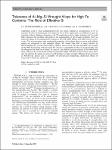Item Infomation
Full metadata record
| DC Field | Value | Language |
|---|---|---|
| dc.contributor.author | Österreicher, J. A. | - |
| dc.contributor.author | Arnoldt, A. R. | - |
| dc.contributor.author | Gneiger, S. | - |
| dc.date.accessioned | 2023-09-14T09:28:00Z | - |
| dc.date.available | 2023-09-14T09:28:00Z | - |
| dc.date.issued | 2023 | - |
| dc.identifier.uri | https://link.springer.com/article/10.1007/s11661-023-07180-z | - |
| dc.identifier.uri | https://dlib.phenikaa-uni.edu.vn/handle/PNK/9018 | - |
| dc.description | Cc-BY | vi |
| dc.description.abstract | Aluminum scrap is often contaminated with steel parts, leading to accumulation of Fe in recycled Al alloys. Consequently, low limits for Fe in Al wrought alloys are difficult to meet by recycling without dilution with primary Al. Wrought alloys with a higher tolerance for Fe could help overcome this problem and improve the sustainability of Al wrought products. Here we study the effects of increasing the Fe content in EN AW-6060, 6005A, and 6082 from 0.2 to 0.7 wt pct. The microstructure and mechanical properties of the alloys after extrusion and artificial ageing are compared to the standard alloys. We found that 6082 is more tolerant to above-standard Fe contents than 6005A, which in turn is more tolerant than 6060: the strength of the 6082-based alloy with increased Fe content is comparable to that of standard 6082 and the elongation at break is increased. In contrast, the artificial ageing potential of the 6060-based alloy with more Fe is drastically reduced compared to 6060. | vi |
| dc.language.iso | en | vi |
| dc.publisher | Springer | vi |
| dc.subject | Aluminum scrap | vi |
| dc.subject | Fe content in EN AW-6060 | vi |
| dc.title | Tolerance of Al–Mg–Si Wrought Alloys for High Fe Contents: The Role of Effective Si | vi |
| dc.type | Book | vi |
| Appears in Collections | ||
| OER - Khoa học Vật liệu, Ứng dụng | ||
Files in This Item:

